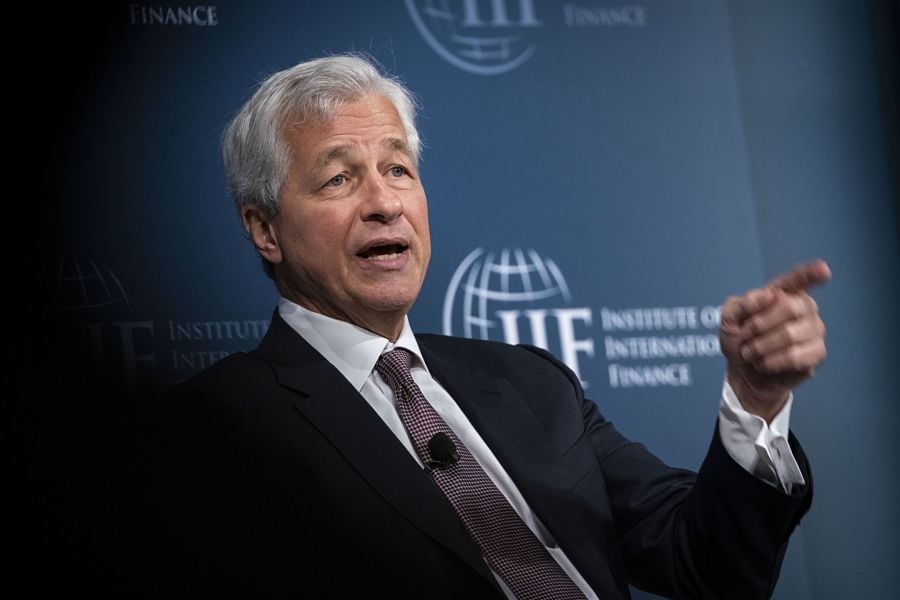

JPMorgan Chase & Co. shareholders should vote against Chief Executive Jamie Dimon’s pay package, proxy advisory firm Glass Lewis & Co. recommended, citing a “disconnect” between his compensation and the bank’s performance.
Of particular concern is $52.6 million in option awards granted to Dimon, “nearly double the size of his regular equity grant for 2021” and representing much of his $84.4 million in annual pay, Glass Lewis said in a report. The firm also criticized the $53.3 million in total compensation for Daniel Pinto, the president and chief operating officer, which included almost $27.9 million in option awards.
“Excessive one-off grants to the CEO and COO amid tepid relative performance worsen long-standing concerns regarding the company’s executive-pay program,” Glass Lewis said in its report. “Shareholders should consider the company’s sustained disconnect between executive pay and performance over the last nine years.”
The advisory resolution, up for a vote by shareholders at the New York-based bank’s annual meeting on May 17, is nonbinding. Glass Lewis and other firms that analyze company disclosures to advise investors how to vote at yearly meetings have come out against a slew of recent high-profile awards. Companies have said the awards are necessary to retain leadership in a heated market for talent.
The options grant given to Dimon is intended to show the board wants him “to continue leading the firm for a significant number of future years,” JPMorgan said in response to Glass Lewis’s recommendation. In the case of pay for the company’s president, “the board is acting responsibly in shareholders’ best interests in case Mr. Pinto needs to once again serve as CEO as a result of unforeseen circumstances.”
In 2020, the 59-year-old Pinto served as acting co-CEO while Dimon was sidelined by emergency heart surgery just as the coronavirus pandemic roiled markets. Since then, Pinto has moved to New York from London to assume the roles of sole president and COO, titles he shared with Gordon Smith before Smith’s retirement.
JPMorgan valued the options that make up Dimon’s and Pinto’s special bonuses for accounting purposes, but the amount they will ultimately be paid is subject to change based on JPMorgan’s stock price.
The grant to Dimon “incentivizes a successful leadership transition by requiring the CEO’s leadership for at least five years before the awards vest and another five years until he may sell any vested shares,” which “ensures direct alignment with shareholder returns over the next decade,” JPMorgan said in its response. (The 66-year-old Dimon, whenever asked how long he will remain CEO, has long joked that he’ll stay for five more years.)
Rival Wall Street giant Goldman Sachs Group Inc. awarded special bonus grants in October to CEO David Solomon and President John Waldron that put them in line for about $50 million in one-time bonuses, saying they were intended to guarantee leadership continuity and talent retention. Glass Lewis recommended shareholders vote against their pay package as well.
Institutional Shareholder Services, another large proxy-advisory firm, also has recommended voting against the pay packages for Dimon and other JPMorgan executives. Compensation for top finance executives, including those at JPMorgan and Goldman, has lost much of its value with recent market declines. JPMorgan’s share price is down almost 30% since its October high, and is below its pre-pandemic levels.

Relationships are key to our business but advisors are often slow to engage in specific activities designed to foster them.

Whichever path you go down, act now while you're still in control.

Pro-bitcoin professionals, however, say the cryptocurrency has ushered in change.

“LPL has evolved significantly over the last decade and still wants to scale up,” says one industry executive.

Survey findings from the Nationwide Retirement Institute offers pearls of planning wisdom from 60- to 65-year-olds, as well as insights into concerns.
Streamline your outreach with Aidentified's AI-driven solutions
This season’s market volatility: Positioning for rate relief, income growth and the AI rebound
